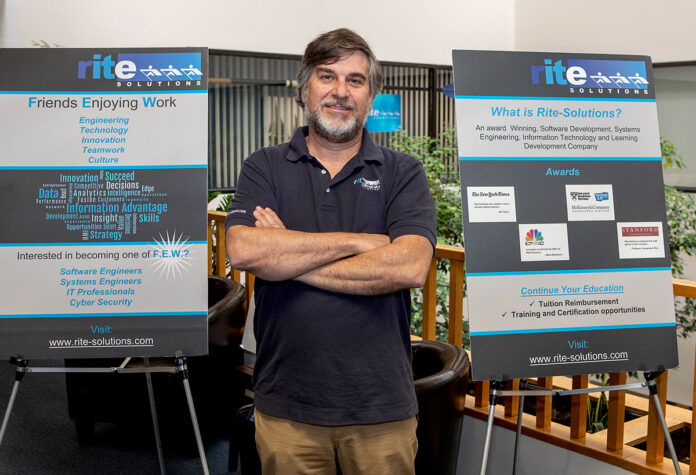
The veteran-owned Rite-Solutions Inc. isn’t really a small company. The Middletown-based engineering and information technology company has about 220 employees.
But as a defense contractor, it’s a little fish compared with the likes of Lockheed Martin Corp. and Raytheon Co.
That’s why it was noteworthy when Rite-Solutions was recently selected to participate in a five-year, $73.7 million contract to help develop future generations of the U.S. Navy underseaweapons.
Rite-Solutions was one of only 17 companies included in the contract, which was announced by the Naval Undersea Warfare Center in Newport last month.
“We are the smallest of the companies on that list,” said CEO and President Dennis McLaughlin, a former Navy officer who served on a nuclear submarine.
“Many of them are large, national companies. We’re actually a small business. We think that’s a real win, that we can play with the big guys,” he said.
That development comes on the heels of another $71.5 million Navy contract awarded to Rite-Solutions six months ago to help develop imaging and electronic warfare systems.
How much difference did it make that Rite-Solutions is owned by two service-disabled veterans? A lot.
McLaughlin said the military experience of the company’s executives and employees matters because it gives them a special understanding of the customer.
“Many of our folks served on submarines and we’ve used this equipment, and predecessors of the equipment we’re designing, so we know what’s really important,” he said. “We know what the customer – the U.S. Navy – is looking for. And because we’re engineers, we know what the engineering force that is trying to produce this thing is looking for. So that gives us a huge advantage.”
The principal owners of Rite-Solutions include Joe Marino and Jim Lavoie, both Navy veterans. Another 20% of the workforce at the company are veterans.
That gives them a leg up in understanding what the client needs. In the most recent U.S. Department of Defense contract, the largest in company history, Rite-Solutions will be competing with the other companies to work on sophisticated software systems that are used in the design and operation of torpedoes.
Announced in February, the contract involves engineering and technical services for the Undersea Warfare Electromagnetic Systems department. The work includes systems engineering, integration and testing, fleet support and lab support for the Navy’s imaging and warfare systems, according to the company.
‘We know what the customer – the U.S. Navy – is looking for.’
DENNIS MCLAUGHLIN, Rite-Solutions Inc. CEO and president
Molly Donohue Magee, the executive director of the Southeastern New England Defense Industry Alliance, said companies that are led by veterans do have an advantage in finding defense-related work because they can certainly use their insight to their advantage.
“Because obviously, they were part of the defense infrastructure,” she said.
The way the Department of Defense sets up contracts includes set-asides for small businesses, including those owned by service-disabled veterans, as well as women and small disadvantaged businesses.
Outside that, smaller companies can also compete effectively by partnering with other like-sized firms or by working with the larger corporations that are defense giants, such as Raytheon.
“If you’re a small business, you’ve got a couple of ways you can look at things,” she said. “There are many means through which a small business can do business with the Department of Defense.”
Engineering and design firms such as Rite-Solutions compete with its talent, as well as on costs. Firms have to be able to document that their professionals have worked on similar projects and have the required experience.
“It’s technical capability that’s really important,” she said. “Do you have the workforce that can do it?”
About 40% of Rite-Solutions’ work relates to the Naval Undersea Warfare Center, which is located on Aquidneck Island, as well. And that geographic proximity also helps, McLaughlin said. But what has become an advantage for the small company is the proximity to universities in southeastern New England that are producing the software engineers and information systems engineers and cybersecurity experts that the company requires.
McLaughlin said Rite-Solutions recruits heavily from University of Massachusetts Dartmouth, University of Rhode Island and Salve Regina University.
Being small can also be an advantage to scoring well in the contract process, because it makes them more agile.
“We are very flexible,” McLaughlin said. “We are very disciplined, like the big companies.”
They can move more quickly on decision-making. “We don’t have staffs of people that you have to [bring] something to get a decision. We just look around the table and say, ‘Do you want to do it? Let’s do it.’ ”
Mary MacDonald is a PBN staff writer. Contact her at Macdonald@PBN.com.












